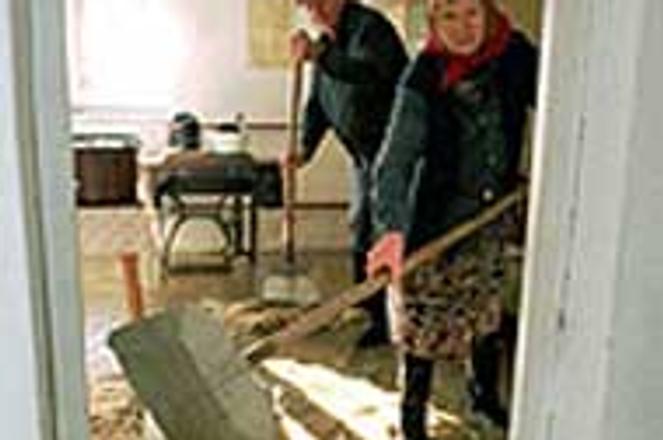River water has been flooding into homes and basements in the Košice region of Slovakia, leaving some people homeless.photo: TASR
Since 1989, the Slovak political elite has been claiming their foreign orientation is towards Europe and western alliances such as NATO. Ten years after the fall of communism in former Czechoslovakia, however, Slovakia's path westward continues to be blurred by a significant Russian influence on the country's economic and political development.
Some of the ties, such as the 1.2 billion dollar chain of the Russian debt to Slovakia, are remnants of communist days. Others blossomed during the 1994-1998 government of Prime Minister Vladimír Mečiar, who signed a wide range of defence and civil contracts with the former superpower, political analysts said.
Other ties continue to be strengthened by the current government, even as the cabinet proclaims its desire to join the EU. A treaty binding Slovakia to Russian oil supplies until 2014, for example, was signed in January by Economy Minister Ľudovít Černák.
Ties with Russia continue
In the last four years, Slovakia has been excluded from both NATO and EU entry front-runner groups, largely due to the undemocratic reign of the Mečiar government. But analysts said that another major reason keeping Slovakia out of entry vanguards were the country's close ties with Russia, as well as the appearance that close ties still existed.
Alexander Duleba, an analyst with the Slovak Foreign Policy Association, an independent think tank, claimed that even though most Russian political influence disappeared with the departure of Mečiar, the new government of Prime Minister Mikuláš Dzurinda was not a group of white knights on white horses.
To support his argument, Duleba pointed to the fact that even though Dzurinda's cabinet has openly declared its intention to enter NATO and the European Union, they did not do anything to break the chain of economic dependence on Russia as a supplier of gas and oil, two commodities that were crucial for the economy of any country.
According to economic analyses by the Slovak Foreign Policy Association, Slovakia currently imports 100% of gas and about 90% of oil from Russia. The situation will likely continue, as in a January 14-15 visit to Russia, Economy Minister Černák signed a contract binding Slovakia to imports of Russian oil until 2014.
Duleba criticized Černák's move, asking why Slovakia had tied itself for the next 15 years to Russian energy supplies, while at the same time both Dzurinda and Černák proclaimed the cabinet's intent to diversify the nation's supply of gas and oil. "Why was it so important to sign the contract so quickly?" he asked.
Another issue igniting suspicions of close relations between Russia and the current government is the way in which the Russian debt towards Slovakia is being settled. When part of the political opposition during the Mečiar era, current Finance Minster Brigita Schmögnerová strongly criticised Devín Banka, the bank which was administering the Russian debt, claiming it was not acting transparently. Now that Schmögnerová holds office, however, she has apparently reinstated the Russian-Slovak owned Devín Banka as the administrator of the debt.
Schmögnerová sent a letter to her Russian counterpart on February 19 telling him the Devín Banka arrangement would continue. Dzurinda has since announced he would like the matter brought to a public tender.
According to Ľuboš Kubín, an analyst with the Slovak Academy of Science, the Devín Banka situation and others like it shows there are still strong Russian lobby groups in Slovakia, whose economic interests are being promoted by top political forces.
"Business with the east has always been done through politics, which is a bad sign for the country's reputation in the west," Kubín said. He added that because Devín Banka's Russian contacts had given it a major advantage in competing against other potential banks for the debt administration contract, it should have been excluded from the process.
Growing pains
The analysts added, however, that such problems, and the perception of Russian influence they created, were more a product of clientelism in top Slovak politics than about intimate political ties to Russia. Kubín said a lack of transparency of the sort continuing in the Devín Banka case indicated that larger problems awaited Slovakia as it makes the transition to a democratic country.
"What is awaiting Slovakia is a long and painful process of learning to become an independent and sovereign country responsible for its own development," he said.
Sergej Chelemendík, a political analyst and director of the private Slavonic House Publishers, agreed that Slovakia's mixed reputation in the west was due not to Russian political interests in Slovakia, but to corruption and clientelism in top Slovak politics.
Kubín added that he did not think Slovakia's remaining ties with Russia would significantly skew the country's current westward orientation. Gone, he said, were the days of open Russian support for Slovak politicians. Russian President Boris Yeltsin, for example, stated in public before the September 1998 national elections in Slovakia that his government "wished, really wished Mr. Mečiar would win the elections."
"Russia wanted Slovakia to be its Trojan horse inside western alliances, but the political aspect of Russia's influence on the development of this country has gone with Mečiar," Kubín said.


